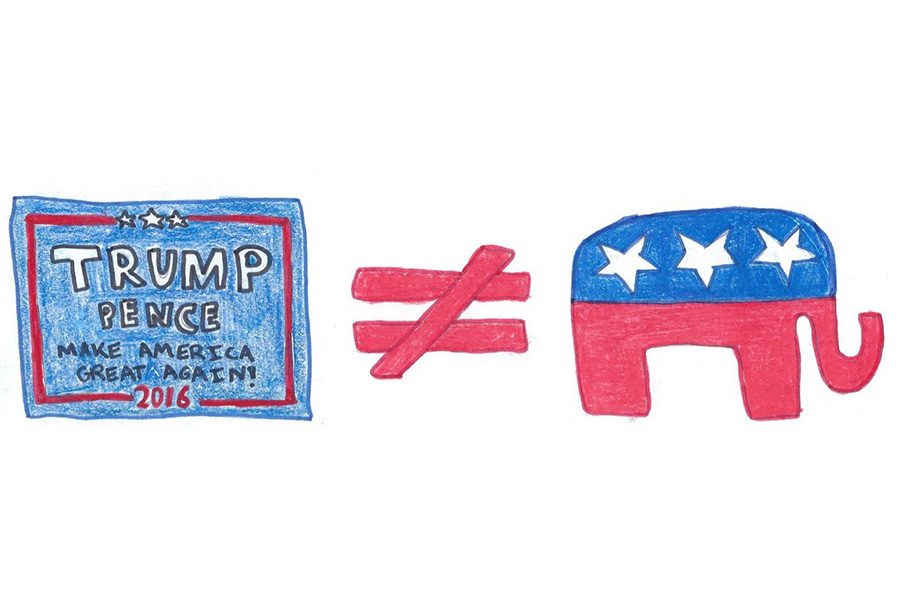Being a Republican in Trump’s America
Photo by Molly Kyles
Illustration
October 17, 2017
You’re Racist. Sexist. Homophobic. Xenophobic. Islamophobic. You hate immigrants. You’re heartless. You want to deport everyone. And you blindly follow Donald J. Trump.
These phrases, inextricably bound to the Republican Party, are dangerous. They help keep the hostile and cold political environment aggressive, and that polarization lets stereotypes thrive.
Not all Republicans are identical, and surprisingly, not all Republicans support Trump.
“[I don’t support Donald Trump]. Donald Trump is, in my opinion, not a real Republican,” senior Corbin Hamilton said. “I think he hijacked the Republican Party and used it as a tool to get himself elected. He does not embody conservative or Libertarian beliefs. I think he reflects badly on the party, since he heads it.”
And not so surprisingly, some Republicans do support Trump.
“I do support President Trump,” senior Landon Ryden said. “I’ve spent a lot of time researching his positions, and have found that much of what he was elected for could very well help this nation to prosper.”
And though these two Republicans seem to be clearly opposed, they hold eerily similar beliefs in small government and conservative economics.
“I identify much more closely with Republican ideals like small government and less intervention into the economy and that type of thing,” Hamilton said. “I agreed with a lot of their ideas especially economics. Also the sort of big government, progressivist ideas of the Democratic Party are what kind of pushed me over to the right.”
One uniting factor between Republicans is their experience with the recent disparaging of the Republican Party name.
“The label Republican has really become one that is seen negatively in America, very much like how the label Liberal has, even though both are very respectable ideas,” Ryden said. “I see Republican as the anti-slavery party it was founded for, and the party of prosperity for all Americans, and the party of civil rights during the 20th century, as history clearly tells us. Unfortunately, people don’t see it that way.”
Hamilton, however, sees a specific cause to this poor reputation.
“Donald Trump has drastically decreased the reputation of the party,” Hamilton said. “You’ve got this man who clearly doesn’t embody Republican values, small government and that sort of thing, and he’s leading the party of Lincoln, the party of Reagan, and people see him and think that’s the Republican Party, but I really don’t think it is. I think that just because he was elected on the Republican name he does not represent Republican ideals. I think he’s sort of hollowed it out and built up his own sort of cult of personality.”
Revealing their Republican viewpoints proves to be a minefield for both of these students.
“When I tell people I’m a Republican, I typically get a confused look and a ‘Really?’” Ryden said. “People know I’m a smart guy and definitely not an idiot, so they can be a little taken aback at first, given the stereotypes our society has for Republicans.”
But despite all the bad press the Republican Party may get and the differing opinions members of the party may hold, these students stand with the label and strive to improve its connotations.
“I think it’s important if you’re a Republican to stay with the Republican Party,” Hamilton said. “You’re still a member of the party even if you don’t agree with the president, and even if he doesn’t agree with the ideas of small government and low taxes, you are still a Republican because that’s what the party was founded on.”
















Irving Berlin • Nov 10, 2017 at 10:39 am
All we ask is to be left alone.